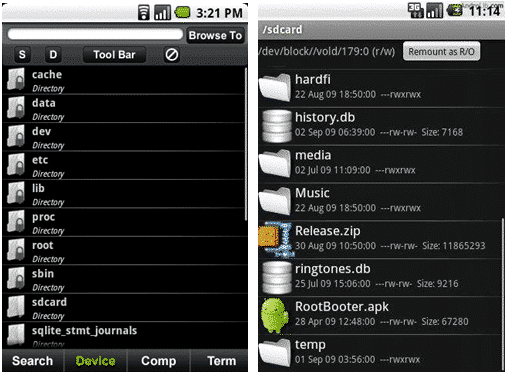Root Explorer – How Is It Useful for Different Android Phone Users?
Android is a mobile phone operating system that attracts everyone, from normal users to hackers and also the users with the mindset of a developer. File management on Android involves different tasks for different users. While some may like to discard unwanted applications forced by the mobile phone manufacturers or carriers, others may wish to peep into the root directories of their handsets. Root Explorer is available as one powerful Android application that makes file management hassle-free for all and even fascinating for some.
Root Explorer can assist an Android user to access each of the file stored inside the phone’s hard disk and SD memory card. The root directory in an Android phone is mounted as ‘read-only’. With Root Explorer, you can attain the privilege to mount it as writable and carry out a number of tasks as well. However, it is recommended that users with at least basic knowledge of mobile phone rooting should take this feature of the application seriously.
That doesn’t mean that Root Explorer is of no use for the normal users who has less knowledge on the Android phone technicalities. The application can help them to delete bad or unwanted applications with ease. It eliminates the need to connect your device to a personal computer and use a PC file management tool. You must know that PC tools may not have access to every file of the phone and PC-based file management may not be easy to handle. Root Explorer can conveniently help the normal users to carry out routine tasks and is a shining exception in this case.
When it comes to the serious users (hackers and developers), Root Explorer proves its real essence. Here are some notable utilities of the application for these users:
SQLite Database Viewer: Allows the users to create, edit and modify SQLite databases present in the Android phones.
XML Viewer: The users with developer’s mind can use this feature to examine the XML content of any file in a friendly environment.
Text Editor: The feature allows hackers and developers to conveniently make changes in Android files and applications through an in-built text editing system.
Zip and Tar: Root Explorer offers options like ‘Zip this folder’ and ‘Create Tar’ to compress any folder available in the root directory and use it as backup. This reduces the amount of space taken as well.
Send Files: It is another useful option which allows the user to send files stored in their handsets via email or Bluetooth.
Root Explorer, with many more similar options for the basic as well as advanced users, is fast becoming a popular file manager. Available at a decent price, the application can certainly help you unleash the real potential of your Android smart phone.



Hello i liked your well written description here. As i am new to android at this level some descriptions are hard to understand, yours was a joy to read. I have a galaxy s which has a few problems. The only way i can install root explorer on it is from a pc.? Any suggestions on how to do this would be much appreciated. Thanks….